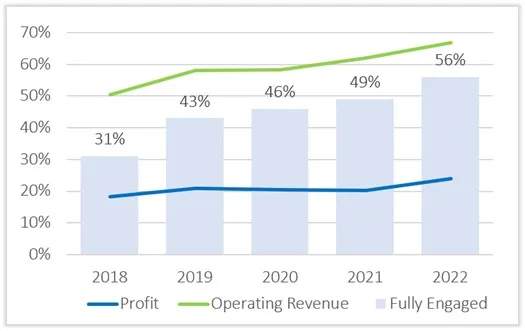
Case Study: Capricorn Group
Engaging for Success
Stephanie Viljoen
Group Executive: Human Capital and Citizenship

The Company
Capricorn Group Limited is a Namibian financial services group listed on the Namibian Stock Exchange. It operates across Namibia and Botswana with diverse business interests. Established in 1982, the group was listed on the Namibian Stock Exchange in June 2013. It maintains strong growth, consistent with its historical performance. The Group employs circa 2500 individuals who make up a diverse workforce. The organisational culture encourages exceptional performance, supported by a strong sense of responsible behavior. The organisation's purpose is to improve lives through leadership in financial services by being Connectors of Positive Change.
The Challenge
Employees have been central to the strategy of the Group, and in 2013 the group made a deliberate choice to prioritise the employee value proposition. In 2017 the Group launched The Capricorn Way as the organisational code to unlock potential in individuals and collectively across all stakeholders. It combines the organisation's beliefs, values, norms, and behaviours.
The Capricorn Way has evolved since 2017, and during the last six years, the focus has been on incorporating the culture into the business across people, practices, and processes, with the emphasis on fostering committed and dedicated employees, i.e. engaged employees.
Implementing employee engagement and being deliberate about it is a critical mindset shift for any organisation. The challenge that the Group faced was how to incorporate aspects of employee engagement into different elements of the employee experience and how to embed engagement as an integral part of the entire employee lifecycle. This spans the talent investment cycle from a robust recruitment strategy, an onboarding process focused on engagement, and the transformation of performance conversations, to the personalisation of retention. The question, however, remained – how will success be measured?
The Approach
Given the importance of engagement, it is critical to understand what can be done to improve it. The most significant cause of a workplace engagement program's failure is that it is regarded as something that Human Capital needs to solve. In most organisations, leaders do not own engagement, there is no expectation that they need to work with Human Capital to improve it, and a significant number of employees do not understand engagement. The Group consequently adopted a philosophy of driving employee engagement through ongoing business improvement and policy design processes, with the ultimate objective of embedding engagement as part of the organisation's DNA.
Capricorn Group engaged Mindset Management – a South African-based business that was founded due to the inability of existing employee engagement solutions to deliver anything more than top-level feedback to executives. Mindset’s Engage EX platform and the Flow@Work employee engagement model were used to measure employee engagement as the basis for developing a meaningful engagement strategy and to assist leaders and teams to start conversations and approach engagement issues authentically and meaningfully. The platform’s team-level best-practices recommendations were adapted and aligned with the Group’s Human Capital practices, and personalised engagement reports for survey respondents were used as a means to involve individual employees in the engagement process.
When first completing the engagement survey in 2018, the Group had a participation rate of 78%, with 76% of employees either “engaged” or “fully engaged” – with engagement defined as a function of the employees’ commitment (emotional commitment to the organisation and its values) and willingness (willingness to exert discretionary effort to help the organisation achieve its goals). This was regarded as good results that aligned with the benchmark data. To ensure that engaged employees remained committed and motivated and proper attention is focused on employees that were not engaged, a detailed analysis was done of the results, and working groups were established to focus on qualitative and quantitative feedback.
During the last five years, the engagement survey was completed on a yearly basis. Human Capital practices were adapted and changed based on the outcomes of the engagement survey. Some of the key initiatives were (1) a deliberate focus to ensure that all employees understand the organisation's strategy and how each role fits into the execution thereof, (2) the reframing of Performance Management to Performance Development, (3) the shaping of Talent investment – covering the entire lifecycle of an employee, and lastly (4) the introduction of a Diversity, Equity and Inclusion programme. These initiatives were supported by a number of tools that enhanced behavioural changes through micro-learning modules, including the launch of a Digital Academy and coaching programme that enhanced the capability of leaders whilst exploring the right mindsets needed to foster engagement.
The Outcomes
The engagement survey participation rate increased from 78% in 2019 to 93% in 2023. The percentage of fully engaged employees also rose from 31% to 56% over the same period.

Starting with the bottom line in the graph below, Profit (blue) and Operating Revenue (green) both increased over the time series, suggesting that the Group performed well despite difficult economic times exacerbated by COVID-19. The overlap of the Profit and Operating Revenue lines with the percentage of fully engaged employees (blue bars) reveals a distinct correlation between business performance and employee engagement over the same period.

Together, these metrics suggest that Capricorn's Human Capital strategy supports enhanced business performance and progressively increasing levels of employee engagement. It further indicates that the model of engagement used is fit for purpose and aligns with the constructs that deliberately improve business results. The holistic implementation of human capital practices supported by line leaders has been cited as the driving force behind the increase in engagement scores.
The above speaks to a holistic Human Capital model focusing on integrated practices operating in an ecosystem. across culture, talent, and leadership. It has been indicated that when these factors are in place, an employee will have a positive experience, leading to increased engagement and, in turn, sustainable business performance. To quote Thinus Prinsloo, Group CEO: "The Group's strong performance, despite difficult operating environments, is largely due to dedicated and committed staff and leadership".
